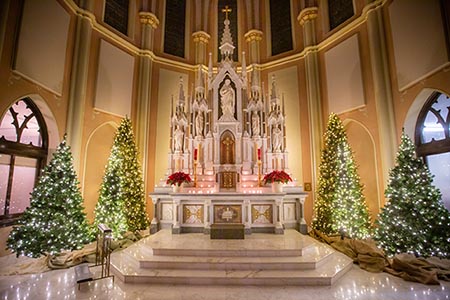
Explore the joy and mystery of Christmas with a Jesuit neuroscientist

The holiday season is a time for joy and gratitude. We caught up with Rev. Christopher Krall, SJ, PhD, to explore the joy, mystery and meaning of Christmas through his lens as a Jesuit priest and professor of neuroscience.
Q: From your perspective, what makes Christmas such a joyful time for so many people?
A: Christmas is a time of tradition and joy—what some call the most wonderful time of the year. From a theological perspective, it is a season that highlights how deeply loved we are as humanity. It’s a time to recognize the gift of life and respond to this love by loving in return.
Saint Ignatius of Loyola, the founder of the Jesuits, emphasized this in the Contemplation of the Incarnation. He invites us to imagine the Holy Trinity looking down on a world filled with suffering and sin. Moved by love, the Trinity enters into this world to work redemption and show humanity the power of self-giving love. This gift—the incarnation of Christ—is a profound reminder of how much our lives matter and how we can bring meaning to others through love.
The traditions of gift-giving, sharing meals and serving others during Christmas embody this divine love and joy. It’s a celebration of life, of love and of the recognition that we are meant to share these gifts with the world.
Q: How does neuroscience explain the joy we feel during the holidays?
A: Neuroscience has explored the brain's role in joy, linking it to areas like the amygdala and hippocampus. Joy often blends memories with the present moment, creating a sense of peace and connection.
Traditions play a big role in this. Familiar smells, tastes and rituals can evoke warm memories, such as baking cookies with a loved one or hearing a favorite carol. These sensory cues connect us to our past and present, while also inspiring hope for the future.
During Christmas, the “fight or flight” system in our brains tends to quiet down, allowing us to enter a state of rest and connection. This peace fosters moments of transcendence where the physical, mental and spiritual align. While neuroscience helps us understand these processes, it also reminds us that we are more than our biology. Christmas joy transcends the everyday, inviting us to embrace our full humanity—body, mind and spirit.
Q: What role does spirituality play in shaping the warmth and community we feel at Christmas?
A: Spirituality helps us look beyond the material aspects of Christmas—gifts, food and entertainment—to focus on relationships and the deeper meaning of the season.
Christmas, at its heart, is about presence—being present with loved ones and recognizing the gift of life. This presence transcends material concerns, reminding us to focus on what truly matters: relationships, love and the sacredness of life.

Q: You mentioned the Trinity as a mystery that we can't fully understand. How does this idea relate to your work in neuroscience?
A: There is a strong connection between theology and neuroscience, especially in understanding relationships. As Christians, we believe we are made in the image of a relational God—the Trinity. This relational nature is reflected in our biology.
Social neuroscience highlights the effects of relationships—or the lack thereof—on our well-being. Chronic loneliness, for example, has physiological ramifications comparable to smoking a pack of cigarettes daily. It affects our breathing, blood pressure, heart rate and contributes to chronic illnesses.
If we are relational beings, as the Trinity is relational, then our flourishing depends on connection with others. Just as the Father, Son and Holy Spirit exist in perfect relationship, we are called to nurture relationships in our lives. When we cut ourselves off from others, we suffer—spiritually, psychologically and physically. Christmas reminds us of the importance of these connections and invites us to share love with those around us.
Q: Do you have any favorite Christmas traditions?
A: My family has strong Polish, German and Slovak traditions. On Christmas Eve, we fast and wait for the first star to appear before beginning our sacred meal. The house is lit by candlelight, and we share opłatek (a Christmas wafer) with blessings for each other.
These traditions remind me of the joy and warmth of family and the sacredness of the season. For me, they’re also about gratitude—reflecting on the blessings of another year and sharing those blessings with others.
Q: What’s on your Christmas list this year?
A: This Christmas, I’ll be serving as a naval chaplain in Djibouti, Africa. My hope is to bring joy and comfort to military personnel stationed there. Being away from family during the holidays is difficult, but I pray for a sense of hope, community and fraternity among those who have given so much for others.





